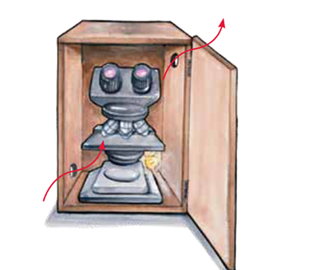Content Status
Type
Linked Node
Storing a Microscope
Learning ObjectivesThe learner will be able to store a microscope as per guidelines.
H5Content
Content
Proper handling, maintenance and storage of the microscope are essential for proper functioning and life of the microscope.
The microscope should be placed and stored preferably in a box in a dry, dust-free and vibration-free environment, which is specially built in the laboratory (as shown in the figure below).

Figure: Storage of microscope in a wooden box; Source: Laboratory diagnosis by sputum smear microscopy
Important considerations for the storage of microscope
- When the microscope is not being used/ stored overnight, it should be covered or kept in a storage cupboard/box to keep it free from dust.
- Avoid exposing the microscope to direct sunlight.
- Avoid exposing the microscope to moisture as humidity may allow fungus to grow on the lens and cause rusting of the metal parts.
- The stored microscope must be kept warm with a light source to prevent growth of fungus. A bulb holder for a 15-watt bulb should be fixed on the rear wall of the storage cupboard, such that the microscope does not contact the bulb while storing or removing the microscope. The bulb should remain on when the microscope is stored inside the box
- An alternative may be to place plenty of dry blue silica gel into a shallow plate and place it in the box when the microscope is kept in it. Silica gel is blue in colour when it is dry, but when it becomes wet /absorbs moisture it turns pinkish. As soon as the silica gel becomes pink, it should be changed or heated until it turns blue again and then be reused.
Resources
Assessment
| Question | Answer 1 | Answer 2 | Answer 3 | Answer 4 | Correct answer | Correct explanation | Page id | Part of Pre-test | Part of Post-test |
|
Silica gel is blue in colour when it is dry.
|
True | False | 1 |
Silica gel is blue in colour when it is dry.
|
Yes | Yes |
Page Tags
LMS Page Link
Content Creator
Reviewer
Target Audience
- Log in to post comments